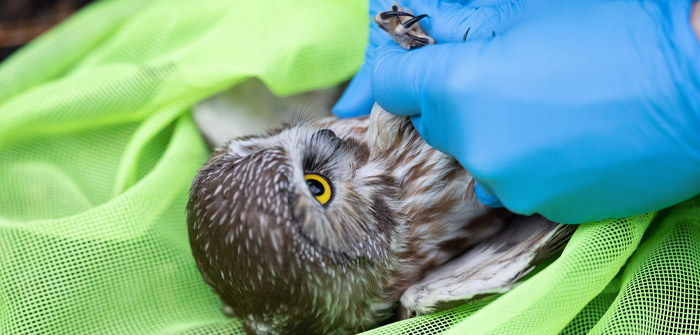(Northern saw-whet owl | Photo courtesy of Think Wild Central Oregon)
Cases of Highly Pathogenic Avian Influenza (HPAI) are on the rise in Oregon and across the U.S., affecting wild bird populations, domestic poultry, cattle, and a few rare cases of pets and humans[1]. Bend wildlife hospital, Think Wild, is closely monitoring the situation and taking strict precautions to prevent potential disease spread at their facility. They also have suggestions for the public for how to keep pets, people, and wildlife safe during this time.
The current H5N1 strain of avian influenza presents a complex challenge for wild bird populations, particularly migratory waterfowl, raptors, and scavenging species. Avian influenza has been detected across 153 wild bird species throughout the United States, with over 10,400 confirmed cases[2]. While waterfowl are natural hosts for avian influenza viruses and typically carry low pathogenic strains without severe illness, this highly pathogenic H5N1 strain has proven unusually persistent and lethal, causing increased deaths among wild geese, shorebirds, and raptors. The virus moves throughout North America during spring and fall migrations, with wild birds serving as both victims and vectors of the disease[3].
Wild birds can both contract and spread avian influenza to and from backyard and commercial poultry flocks primarily through their feces and saliva. The Oregon Department of Agriculture and Oregon Department of Fish and Wildlife (ODFW) have been testing birds and tracking outbreaks of the H5N1 strain of avian influenza, which was first detected in Oregon in 2022[4]. The virus’s concerning spread now extends beyond wild birds and poultry to include various mammals. Oregon reported the first U.S. detection of H5N1 in swine in October 2024, followed by the state’s first human case in November, and most recently, a domestic cat infection linked to raw pet food in December 2024[5]. This expanded range of affected species highlights the virus’s evolving nature and increased transmission risks.
While Think Wild is still accepting most native birds for care, the wildlife center is following restrictions set by ODFW to not treat any adult species of waterfowl, waterbird, or shorebird, which can be asymptomatic carriers of the virus. All wild bird patients are screened for symptoms of avian influenza such as neurologic symptoms or respiratory distress, and sick birds are quarantined from all other patients. Some extreme cases may require immediate humane euthanasia to prevent animal suffering and reduce transmission risks.
About Think Wild:
Think Wild is a 501(c)3 nonprofit organization located in Bend. Our mission is to inspire the High Desert community to care for and protect native wildlife through education, conservation, rescue, and rehabilitation. We provide veterinary treatment and care at the wildlife hospital, staffed by expert wildlife rehabilitation staff, animal husbandry volunteers, and our staff veterinarian. Wildlife conflicts or injuries can be reported to our Wildlife Hotline at 541-241-8680, which is monitored seven days a week from 9am-3pm.
thinkwildco.org • Instagram • Facebook • TikTok @thinkwildco
[1] Center for Disease Control (CDC). H5 Bird Flu: Current Situation. January 3, 2025,
cdc.gov/bird-flu/situation-summary/index.html
[2] Oregon Department of Fish and Wildlife (ODFW). Oregon First State to Report New Spike in Avian Flu Detections during Fall Migration, October 31, 2024,
dfw.state.or.us/news/2024/10_Oct/103124.asp.
[3] Convention on the Conservation of Migratory Species of Wild Animals (CMS) and the Food and Agriculture Organization of the United Nations (FAO). Scientific Task Force of Avian Influenza and Wild Birds, July 2023,
cms.int/sites/default/files/publication/avian_influenza_2023_aug.pdf.
[4] Oregon Department of Fish and Wildlife (ODFW). Oregon First State to Report New Spike in Avian Flu Detections during Fall Migration, October 31, 2024,
dfw.state.or.us/news/2024/10_Oct/103124.asp.
[5] Oregon State University (OSU) Extension. What to know about bird flu in Oregon, January 2025,
extension.oregonstate.edu/announcements/what-know-about-bird-flu-oregon#:~:text=HPAI%20has%20been%20detected%20in,first%20human%20case%20of%20HPAI.



